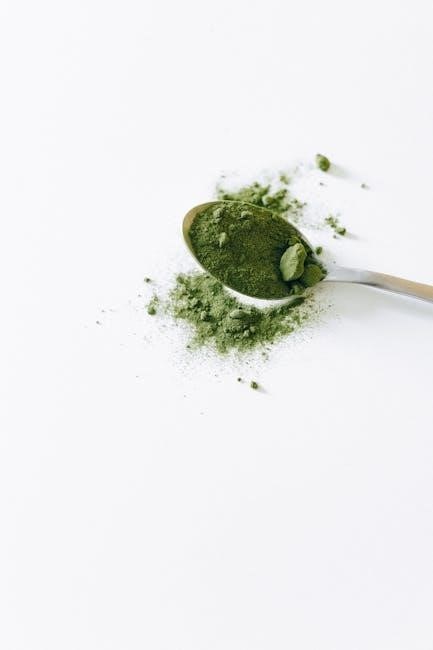Rescue detox instructions provide a structured approach to cleansing the body from toxins. Typically involving specific drinks, diuretics, and hydration strategies to help individuals prepare for detoxification within a limited time frame.
Understanding the Basics of Detoxification
Detoxification is the body’s natural process of eliminating toxins. Rescue detox focuses on accelerating this process, often through specific drinks or supplements. These products typically contain diuretics to increase urine production, helping flush out toxins faster. Proper hydration is crucial, as water aids in diluting urine and enhancing the body’s cleansing abilities. While detox drinks can provide temporary solutions for drug tests, they don’t permanently remove toxins from the body. Understanding how these products work and their limitations is essential for effective use. Always follow instructions carefully to maximize results and ensure safety during the detox process.
Why Rescue Detox is Necessary
Rescue detox is essential for individuals needing quick toxin removal, often for drug tests or health reasons. It provides a structured method to cleanse the body rapidly, utilizing specialized drinks and hydration strategies. This approach helps individuals meet urgent deadlines, ensuring they can achieve their goals without delays. Rescue detox is particularly beneficial for those with high toxin levels, offering a reliable solution to pass tests or begin a healthier lifestyle. By following precise instructions, users can effectively eliminate toxins and regain control over their health and personal circumstances. Timely intervention is crucial for achieving desired outcomes.
Common Misconceptions About Detox
Many believe detox solutions work by eliminating all toxins, but they primarily dilute urine. Others think detox drinks are foolproof, yet they can fail if instructions aren’t followed precisely. Some assume natural cleansing is enough, while others underestimate the importance of hydration. Misconceptions also include believing detox is a one-time fix rather than part of a broader health strategy. Understanding these myths helps set realistic expectations and ensures effective use of detox methods. Proper adherence to instructions maximizes results, avoiding potential pitfalls. Education is key to dispelling these misconceptions and achieving successful detox outcomes. Always follow guidelines carefully.

Preparation for Rescue Detox
Rescue detox preparation involves understanding your body’s needs, setting realistic goals, and gathering essential supplies. This ensures a safe and effective detox process. Proper planning is crucial.
Understanding Your Body’s Needs
Understanding your body’s needs is crucial for a safe detox. Assess factors like weight, toxin levels, and overall health to choose the right detox method. Hydration and nutrition play key roles, with water and nutrient-rich foods supporting the process. Diuretics and specific supplements can aid cleansing, but it’s essential to follow instructions carefully. Avoiding certain foods and substances ensures effectiveness. Everyone’s body is different, so tailoring your approach is vital for optimal results. Consulting a professional can provide personalized guidance. Be mindful of your limits to avoid complications. Proper preparation ensures a smoother detox experience.
Setting Realistic Goals for Detox
Setting realistic goals for detox is essential for success. Understand that detox is not a cure but a process to reduce toxin levels. Define clear, achievable objectives, such as completing the detox program or passing a drug test. Consider the timeframe, as some methods work within hours while others take days. Stay hydrated, eat nutrient-rich foods, and avoid substances that hinder progress. Goals should align with your body’s needs and lifestyle. Be patient, as detox can be challenging. Celebrate small victories to stay motivated. Remember, detox is a step toward a healthier life, not an instant solution.
Essential Supplies for a Successful Detox
Essential supplies for a successful detox include detox drinks, water, and herbal supplements. Detox drinks, like Rescue Detox, are designed to flush out toxins and dilute urine. Water is crucial for hydration, helping your body eliminate waste. Herbal supplements, such as milk thistle or dandelion root, support liver function. Additionally, nutritious foods like fruits and vegetables provide necessary nutrients. A bathroom scale or drug test kit can monitor progress. Ensure you have all supplies ready before starting to avoid interruptions. Having these essentials on hand will help you stay committed and achieve your detox goals effectively. Planning ahead is key to success.

Diet and Nutrition in Detox
A balanced diet rich in fruits, vegetables, and whole grains supports detoxification. Avoid processed foods and sugars to prevent toxin buildup. Hydration is key.
The Role of Hydration in Detox
Hydration is crucial for effective detoxification, as water helps flush out toxins and waste products. Drinking plenty of fluids, including herbal teas and fresh juices, supports kidney function. Proper hydration ensures toxins are efficiently eliminated through urine and sweat. Dehydration can hinder detox processes, so maintaining adequate fluid intake is essential. Additionally, incorporating electrolytes can help balance fluids and support overall detox efficiency. Always choose clean, filtered water to avoid adding more toxins during the detox process. Staying hydrated keeps your body functioning optimally.
Nutrients That Support Detoxification
Certain nutrients play a vital role in enhancing detoxification processes. Vitamins C and E act as antioxidants, protecting cells from damage and supporting the body’s natural cleansing mechanisms. Fiber aids in digestion, ensuring toxins are efficiently eliminated through the digestive system. Milk thistle, artichoke leaf, and dandelion root are known to support liver health, which is central to detoxification. Probiotics promote a healthy gut microbiome, improving nutrient absorption and waste removal. Incorporating these nutrients into your diet can enhance your body’s ability to detoxify effectively and maintain overall well-being.
Foods to Avoid During Detox
During detox, it’s crucial to eliminate foods that hinder the body’s cleansing processes. Processed foods, refined sugars, and red meat should be avoided, as they slow digestion and toxin removal. Alcohol and caffeine can dehydrate the body and impair liver function. Fried and high-fat foods put extra strain on the digestive system, reducing detox efficiency. Additionally, foods high in sodium can lead to water retention, counteracting the effects of diuretics often used in detox. By avoiding these foods, you create an environment where your body can detoxify more effectively and recover faster.

Exercise and Physical Activity
Exercise aids detox by enhancing circulation and promoting sweating, which helps eliminate toxins. Moderate physical activity supports the body’s natural cleansing processes without causing exhaustion. Regular movement is key.
How Exercise Aids in Detox
Exercise plays a crucial role in detoxification by stimulating blood flow and sweat production, which helps flush out toxins. Physical activity enhances lymphatic drainage, supporting the removal of waste products. It also boosts metabolism, aiding the liver and kidneys in processing toxins more efficiently. Additionally, exercise promotes healthy digestion, further facilitating the elimination of harmful substances. Regular moderate exercise strengthens the body’s natural detox mechanisms, making it an essential component of any rescue detox plan. Consistency is key to maximizing these benefits and supporting overall well-being during the cleansing process.
Recommended Exercises for Detox
Yoga, brisk walking, and cycling are excellent exercises for detox. These activities improve blood circulation, promoting the efficient removal of toxins. Swimming and sauna sessions further enhance sweating, which aids in eliminating toxins through the skin. Gentle stretching and light cardio are also beneficial, as they stimulate lymphatic drainage without causing undue stress. Moderate exercise helps maintain energy levels and supports the body’s natural cleansing processes. Consistency is key to achieving optimal results during a detox program. Always choose exercises that align with your fitness level to avoid overexertion and ensure a safe, effective detox experience.
Overexertion and Its Impact on Detox
Overexertion during detox can hinder progress and lead to fatigue or burnout. Intense workouts may deplete energy reserves, complicating the body’s natural detox processes. Pushing too hard can stress the system, reducing efficiency in toxin elimination. It’s crucial to balance physical activity with rest to allow the body to recover and function optimally. Moderate exercise supports detox without overtaxing the body. Listening to your body and adjusting routines accordingly ensures a safe and effective detox experience. Avoid extreme exertion to maintain overall health and progress.
Mental and emotional preparation is vital for a successful detox journey. It involves setting realistic goals, practicing mindfulness, and building a strong support system to stay motivated. Mindfulness practices, such as meditation and deep breathing, can significantly reduce stress during detox. These techniques help calm the mind and body, making the process more manageable. Regular mindfulness sessions can improve emotional resilience, allowing individuals to stay focused on their goals. Incorporating activities like yoga or journaling can also enhance mental clarity and overall well-being. By prioritizing mindfulness, individuals can better navigate the challenges of detox and maintain a positive outlook throughout their journey. These practices not only aid in stress reduction but also foster a healthier mindset for long-term success. A strong support system is crucial during detox, as it provides emotional and practical assistance. Friends, family, or support groups can offer encouragement and help individuals stay motivated. Sharing struggles with trusted individuals fosters accountability and reduces feelings of isolation. Caregivers can assist with daily tasks, provide resources, and remind the person of their goals. Having a reliable network ensures that help is available when challenges arise. Building a support system creates a safer and more encouraging environment for those undergoing detox, helping them stay committed to their journey and long-term well-being. This network can be a key factor in successful detox outcomes. Maintaining motivation during detox is essential for success. Celebrate small victories, like adhering to hydration schedules or completing exercise routines, to reinforce progress. Setting realistic milestones helps build confidence and keeps the process manageable. Reminding oneself of the reasons for detoxing, such as improved health or personal goals, can bolster determination. Engaging in activities that promote mental well-being, like mindfulness or hobbies, also helps sustain motivation. Surrounding yourself with a supportive network and staying positive are key to overcoming challenges and staying committed throughout the detox journey. Consistent encouragement and self-acknowledgment are vital for long-term success. Emergency detox situations require immediate attention to prevent complications. Recognizing severe symptoms like seizures or extreme withdrawal is crucial for timely intervention and professional medical assistance. Identifying detox complications early is vital for effective intervention. Common signs include severe withdrawal symptoms such as seizures, hallucinations, or extreme nausea. Monitor for dehydration, rapid heart rate, or difficulty breathing. Mental health issues like anxiety or depression may worsen. If experiencing intense pain, vomiting, or disorientation, seek immediate medical help. Prolonged or intense symptoms can indicate a need for professional care. Be aware of individual thresholds, as some may require emergency services to prevent life-threatening situations. Timely recognition ensures proper treatment and minimizes risks associated with the detox process. Stay vigilant to safeguard health and well-being. Seek professional help if detox symptoms become severe or unmanageable. Persistent vomiting, seizures, or extreme pain are critical indicators. Mental health struggles, such as suicidal thoughts, require immediate intervention. If dehydration leads to dizziness or fainting, medical attention is necessary. Additionally, consult a healthcare provider if pre-existing conditions worsen during detox. Professional guidance ensures safety and effectiveness, especially for those with chronic health issues. Don’t hesitate to reach out to experts for tailored support and to prevent complications. Timely intervention can significantly improve detox outcomes and overall well-being. Prioritize health by seeking help when needed. During detox, prioritize hydration to prevent dehydration. Administer oral fluids like water or electrolyte solutions to maintain balance. If dizziness occurs, ensure the individual sits or lies down in a safe environment. For mild nausea, offer small sips of ginger tea or crackers. Monitor vital signs closely and provide reassurance to reduce anxiety. If seizures or severe symptoms arise, call emergency services immediately. Keep the person calm and comfortable until professional help arrives. Always follow specific detox product instructions and consult a healthcare provider if unsure. Immediate care can prevent complications and ensure a safer detox process. Supporting a loved one through detox requires empathy, understanding, and practical assistance. Encourage open communication and provide a safe, non-judgmental space to share their struggles. Offer to help with daily tasks, accompany them to appointments, and remind them of their strengths. Educate yourself about detox processes to better understand their experience. Celebrate small victories and remain patient through challenges. Your presence and encouragement can significantly impact their journey toward recovery. Detox struggles often involve physical symptoms like fatigue, headaches, and nausea, which can be challenging to endure. Emotional challenges, such as anxiety and irritability, also arise as the body withdraws from substances. Cravings can be intense, making it difficult to stay committed to the process. Additionally, the mental battle of overcoming addiction while managing daily responsibilities can be overwhelming. Understanding these struggles helps supporters provide compassionate care and practical assistance, fostering a stronger support system during this critical phase. Empathy and knowledge are key to helping individuals navigate detox successfully. Assisting someone in detox requires a supportive and non-judgmental approach. Encourage hydration by ensuring access to plenty of water and herbal teas. Provide healthy meals rich in nutrients to aid the body’s cleansing process. Offer emotional support through active listening and positive reinforcement. Help create a calm environment by minimizing stressors and promoting relaxation techniques like meditation or deep breathing. Remind them to follow detox instructions carefully, such as timing and dosage for any supplements or drinks. Encourage physical activity, like short walks, to stimulate circulation. Above all, be patient and understanding, as detox can be both physically and emotionally challenging. Caregivers and supporters play a crucial role in the detox process. Utilize resources like SAMHSA for behavioral health guidance and local support groups. Educational materials on detoxification can provide insights into understanding the physical and emotional challenges. Online forums and communities offer shared experiences and practical advice. Professional counseling services can also equip caregivers with effective strategies to assist loved ones. Accessing reputable health websites ensures accurate information on supplements and detox methods. By leveraging these resources, caregivers can create a supportive environment that fosters recovery and well-being.
Mental and Emotional Preparation
Mindfulness and Stress Reduction
Building a Support System
Maintaining Motivation Throughout Detox

Emergency Detox Situations
Recognizing Signs of Detox Complications
When to Seek Professional Help
First Aid Measures During Detox

Supporting Others Through Detox
Understanding the Struggles of Detox
Practical Ways to Assist Someone in Detox
Resources for Caregivers and Supporters